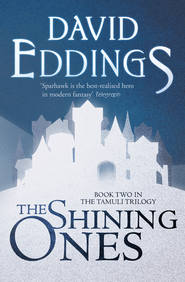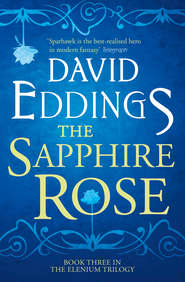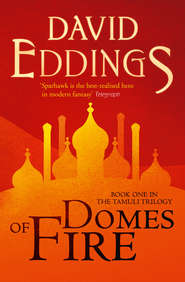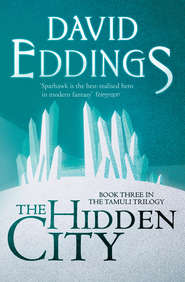По всем вопросам обращайтесь на: info@litportal.ru
(©) 2003-2024.
✖
The Diamond Throne
Автор
Год написания книги
2019
Настройки чтения
Размер шрифта
Высота строк
Поля
He stopped, bent in his saddle, and poured a few small coins into her grimy hand. ‘Go home, little sister,’ he told her in a gentle voice. ‘It’s late and wet, and there’ll be no customers tonight.’ Then he straightened and rode on, leaving her to stare in grateful astonishment after him. He turned down a narrow side street clotted with shadow and heard the scurry of feet somewhere in the rainy dark ahead of him. His ears caught a quick, whispered conversation in the deep shadows somewhere to his left.
The roan snorted and laid his ears back.
‘It’s nothing to get excited about,’ Sparhawk told him. The big man’s voice was very soft, almost a husky whisper. It was the kind of voice people turned to hear. Then he spoke more loudly, addressing the pair of footpads lurking in the shadows. ‘I’d like to accommodate you, neighbours,’ he said, ‘but it’s late, and I’m not in the mood for casual entertainment. Why don’t you go rob some drunk young nobleman instead, and live to steal another day?’ To emphasize his words, he threw back his damp cloak to reveal the leather-bound hilt of the plain broadsword belted at his side.
There was a quick, startled silence in the dark street, followed by the rapid patter of fleeing feet.
The big roan snorted derisively.
‘My sentiments exactly.’ Sparhawk agreed, pulling his cloak back around him. ‘Shall we proceed?’
They entered a large square surrounded by hissing torches where most of the brightly coloured canvas booths had their fronts rolled down. A few forlornly hopeful enthusiasts remained open for business, stridently bawling their wares to indifferent passers-by hurrying home on a late, rainy evening. Sparhawk reined in his horse as a group of rowdy young nobles lurched unsteadily from the door of a seedy tavern, shouting drunkenly to each other as they crossed the square. He waited calmly until they vanished into a side street and then looked around, not so much wary as alert.
Had there been but a few more people in the nearly empty square, even Sparhawk’s trained eye might not have noticed Krager. The man was of medium height and he was rumpled and unkempt. His boots were muddy, and his maroon cape carelessly caught at the throat. He slouched across the square, his wet, colourless hair plastered down on his narrow skull and his watery eyes blinking nearsightedly as he peered about in the rain. Sparhawk drew in his breath sharply. He hadn’t seen Krager since that night in Cippria, almost ten years ago, and the man had aged considerably. His face was greyer and more pouchy-looking, but there could be no question that it was Krager.
Since quick movements attracted the eye, Sparhawk’s reaction was studied. He dismounted slowly and led his big horse to a green canvas food vendor’s stall, keeping the animal between himself and the nearsighted man in the maroon cape. ‘Good evening, neighbour,’ he said to the brown-clad food vendor in his deadly quiet voice. ‘I have some business to attend to. I’ll pay you if you’ll watch my horse.’
The unshaven vendor’s eyes came quickly alight.
‘Don’t even think it,’ Sparhawk warned. ‘The horse won’t follow you, no matter what you do – but I will, and you wouldn’t like that at all. Just take the pay and forget about trying to steal the horse.’
The vendor looked at the big man’s bleak face, swallowed hard, and made a jerky attempt at a bow. ‘Whatever you say, my Lord,’ he agreed quickly, his words tumbling over each other. ‘I vow to you that your noble mount will be safe with me.’
‘Noble what?’
‘Noble mount – your horse.’
‘Oh, I see. I’d appreciate that.’
‘Can I do anything else for you, my Lord?’
Sparhawk looked across the square at Krager’s back. ‘Do you by chance happen to have a bit of wire handy – about so long?’ He measured out perhaps three feet with his hands.
‘I may have, my Lord. The herring kegs are bound with wire. Let me look.’
Sparhawk crossed his arms and leaned them on his saddle, watching Krager across the horse’s back. The past years, the blasting sun, and the women going to the wells in the steely light of early morning fell away, and quite suddenly he was back in the stockyards outside Cippria with the stink of dung and blood on him, the taste of fear and hatred in his mouth, and the pain of his wounds making him weak as his pursuers searched for him with their swords in their hands.
He pulled his mind away from that, deliberately concentrating on this moment rather than the past. He hoped that the vendor could find some wire. Wire was good. No noise, no mess, and with a little time it could be made to look exotic – the kind of thing one might expect from a Styric or perhaps a Pelosian. It wasn’t so much Krager, he thought as the tense excitement built in him. Krager had never been more than a dim, feeble adjunct to Martel – an extension, another set of hands, just as the other man, Adus, had never been more than a weapon. It was what Krager’s death would do to Martel – that was what mattered.
‘This is the best I could find, my Lord,’ the greasy-aproned food vendor said respectfully, coming out of the back of his canvas booth and holding out a length of rusty, soft-iron wire. ‘I’m sorry. It isn’t much.’
‘It’s just fine,’ Sparhawk replied, taking the wire. He snapped the rusty strand taut between his hands. ‘It’s perfect in fact.’ Then he turned to his horse. ‘Stay here, Faran,’ he said.
The horse bared his teeth at him. Sparhawk laughed softly and moved out into the square, some distance behind Krager. If the nearsighted man were found in some shadowy doorway, bowed tautly backward with the wire knotted about his neck and ankles and with his eyes popping out of a blackened face, or face down in the trough of some back-alley public urinal, that would unnerve Martel, hurt him, perhaps even frighten him. It might be enough to bring him out into the open, and Sparhawk had been waiting for years for a chance to catch Martel out in the open. Carefully, his hands concealed beneath his cloak, he began to work the kinks out of his length of wire, even as he stalked his quarry.
His senses had become preternaturally alert. He could clearly hear the guttering of the torches along the sides of the square and see their orange flicker reflected in the puddles of water lying among the cobblestones. That reflected glow seemed for some reason very beautiful. Sparhawk felt good – better perhaps than he had for ten years.
‘Sir Knight? Sir Sparhawk? Can that be you?’
Startled, Sparhawk turned quickly, swearing under his breath. The man who had accosted him had long, elegantly curled blond hair. He wore a saffron-coloured doublet, lavender hose, and an apple-green cloak. His wet maroon shoes were long and pointed, and his cheeks were rouged. The small, useless sword at his side and his broad-brimmed hat with its dripping plume marked him as a courtier, one of the petty functionaries and parasitic hangers-on who infested the palace like vermin.
‘What are you doing back here in Cimmura?’ the fop demanded, his high-pitched, effeminate voice startled. ‘You were banished.’
Sparhawk looked quickly at the man he had been following. Krager was nearing the entrance to a street that opened into the square, and in a moment he would be out of sight. It was still possible, however. One quick, hard blow would put this over-dressed butterfly before him to sleep, and Krager would still be within reach. Then a hot disappointment filled Sparhawk’s mouth as a detachment of the watch marched into the square with lumbering tread. There was no way now to dispose of this interfering popinjay without attracting their attention. The look he directed at the perfumed man barring his path was flat with anger.
The courtier stepped back nervously, glancing quickly at the soldiers who were moving along in front of the booths, checking the fastenings on the rolled-down canvas fronts. ‘I insist that you tell me what you’re doing back here,’ he said, trying to sound authoritative.
‘Insist? You?’ Sparhawk’s voice was full of contempt.
The other man looked quickly at the soldiers again, seeking reassurance, then he straightened boldly. ‘I’m taking you in charge, Sparhawk. I demand that you give an account of yourself.’ He reached out and grasped Sparhawk’s arm.
‘Don’t touch me,’ Sparhawk spat out the words, striking the hand away.
‘You hit me!’ the courtier gasped, clutching at his hand in pain.
Sparhawk took the man’s shoulder in one hand and pulled him close. ‘If you ever put your hands on me again, I’ll rip out your guts. Now get out of my way.’
‘I’ll call the watch,’ the fop threatened.
‘And how long do you think you’ll continue to live after you do that?’
‘You can’t threaten me. I have powerful friends.’
‘But they’re not here, are they? I am, however.’ Sparhawk pushed him away in disgust and turned to walk on across the square.
‘You Pandions can’t get away with this high-handed behaviour any more. There are laws in Elenia now,’ the overdressed man called after him shrilly. ‘I’m going straight to Baron Harparin. I’m going to tell him that you’ve come back to Cimmura and about how you hit me and threatened me.’
‘Good,’ Sparhawk replied without turning. ‘Do that.’ He continued to walk away, his irritation and disappointment rising to the point where he had to clench his teeth tightly to keep himself under control. Then an idea came to him. It was petty –even childish – but for some reason it seemed quite appropriate. He stopped and straightened his shoulders, muttering under his breath in the Styric tongue, even as his fingers wove intricate designs in the air in front of him. He hesitated slightly, groping for the word for carbuncle. He finally settled for boils instead and completed the incantation. He turned slightly, looked at his tormentor, and released the spell. Then he turned back and continued on across the square, smiling slightly to himself. It was, to be sure, quite petty, but Sparhawk was like that sometimes.
He handed the food vendor a coin for minding Faran, swung up into his saddle, and rode across the square in the misty drizzle, a big man shrouded in a rough woollen cloak, astride an ugly-faced roan horse.
Once he was past the square, the streets were dark and empty again, with guttering torches hissing in the rain at intersections and casting their dim, sooty orange glow. The sound of Faran’s hooves was loud in the empty street. Sparhawk shifted slightly in his saddle. The sensation he felt was very faint, a kind of prickling of the skin across his shoulders and up the back of his neck, but he recognized it immediately. Someone was watching him, and the watcher was not friendly. Sparhawk shifted again, carefully trying to make the movement appear to be no more than the uncomfortable fidgeting of a saddle-weary traveller. His right hand, however, was concealed beneath his cloak, and it sought the hilt of his sword. The oppressive sense of malevolence increased, and then, in the shadows beyond the flickering torch at the next intersection, he saw a figure robed and hooded in a dark grey garment that blended so well into the shadows and wreathing drizzle that the watcher was almost invisible.
The roan tensed his muscles, and his ears flicked.
‘I see him, Faran.’ Sparhawk replied very quietly.
They continued on along the cobblestone street, passing through the pool of orange torchlight and on into the shadowy street beyond. Sparhawk’s eyes readjusted to the dark, but the hooded figure had already vanished up some alleyway or through one of the narrow doors along the street. The sense of being watched was gone, and the street was no longer a place of danger. Faran moved on, his hooves clattering on the wet stones.
The inn which was Sparhawk’s destination was on an unobtrusive back street. It was gated at the front of its central courtyard with stout oaken planks. Its walls were peculiarly high and thick, and a single, dim lantern glowed beside a much-weathered wooden sign that creaked mournfully as it swung back and forth in the rain-filled night breeze. Sparhawk pulled Faran close to the gate, leaned back in his saddle, and kicked the rain-blackened planks solidly with one spurred foot. There was a peculiar rhythm to the kicks.
He waited.
Then the gate creaked inward and the shadowy form of a porter, hooded in black, looked out. He nodded briefly, then pulled the gate wider to admit Sparhawk. The big knight rode into the rain-wet courtyard and slowly dismounted. The porter swung the gate shut and barred it, then he pushed his hood back from his steel helm, turned, and bowed. ‘My Lord,’ he greeted Sparhawk respectfully.
‘It’s too late at night for formalities, Sir Knight,’ Sparhawk responded, also with a brief bow.
‘Formality is the very soul of gentility, Sir Sparhawk,’ the porter replied ironically. ‘I try to practise it whenever I can.’











